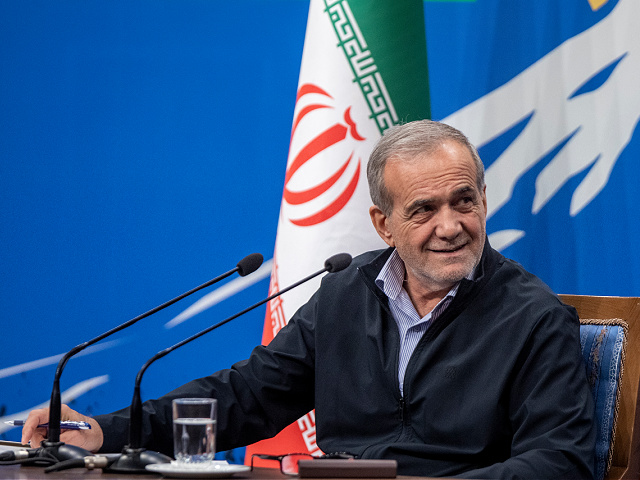Iran is bolstering its influence in Iraq by moving in leaders of its proxy terrorist organizations Hamas and the Yemeni Houthi movement, the left-wing New York Times reported on Sunday — days after Iranian President Masoud Pezeshkian concluded a visit to the neighboring country.
Pezeshkian, elected in a special election following the death of predecessor Ebrahim Raisi in a mysterious helicopter crash in May, made a tour of Iraq his first international visit while in office. Pezeshkian departed the country on Friday after visiting Baghdad, meeting with Kurdish leadership in Erbil, and concluding with a stop in Basra. He emphasized unity and cooperation among Muslim political entities during his conversations there and reportedly signed 14 memoranda of understanding with the Iraqi government in Baghdad.
The Iraqi government has not openly boasted of helping its proxies expand their influence in Baghdad. The New York Times noted that it only confirmed the official presence of Hamas and the Houthis in the Iraqi capital via unnamed officials and that both terrorist organizations are attempting to keep a low profile in the country. The Houthis, as a Shiite terrorist organization, has reportedly received an especially “warm” welcome from the Shiite terrorist coalition known as the Popular Mobilization Forces (PMF), which became an official arm of the Iraqi armed forces during the war against the Sunni Islamic State “caliphate.”
“Iraqi government officials quietly allowed both Iranian-backed armed groups [Hamas and the Houthis] to establish a more permanent presence in Baghdad early this summer,” the Times reported, claiming that “Iraqi officials deny publicly” this has occurred.
The erosion of American influence in the country under currently President Joe Biden appears to have played a role in the terrorists moving in, as the Times sources indicated Baghdad would rather not have Iran’s proxies grow roots there.
“Some Iraqi government officials, according to two of the people who spoke to The New York Times, say privately they are not thrilled about their new guests, but did not have the power to block them,” the leftist newspaper asserted, “given the sway of the Iraqi political parties with ties to Iran.”
The PMF are reportedly deeply involved in ensuring that Hamas and the Houthis can successfully operate in the country. According to the Times, Kata’ib Hezbollah, one of the most prominent Shiite terrorist groups in the PMF, has helped Hamas with security, while fellow PMF terror squad Asa’ib Ahl al-Haq have helped the Houthis.
While the Iraqi government has formally avoided loudly discussing the invasion of foreign terrorist organizations, radical Islamist lawmakers in Iraq have embraced it; the Times noted the Houthis found in Iraq an “especially warm” welcome.
“The presence of a representative of the Houthis in Iraq is welcomed by all political parties in Iraq,” it quoted one Shiite lawmaker, Saad Al-Saadi, as saying.
Adding to the Times‘ reporting, the news outlet Israel Hayom reported on Sunday that Iran’s Islamic Revolutionary Guard Corps (IRGC) — a U.S.-designated terrorist organization and formal arm of the Iranian government — presided over an oversight “operations committee” in Iraq in March to help its terrorist proxies coordinate with each other. The committee reportedly brought together several PMF groups and the Houthis.
“Subsequently, in May, the Houthi leader, Abdul-Malik al-Houthi, announced the beginning of coordination of military operations between his militia, Ansar Allah, and pro-Iranian Shiite militias in Iraq,” Israel Hayom added.
The IRGC has for years been closely linked to Iraq’s PMF. The terrorist organization has long used its Quds Force, a wing of the IRGC dedicated to foreign terrorist attacks, to coordinate with PMF jihadists, particularly for anti-American operations. The pioneer of such coordination was former Quds Force chief Qassem Soleimani, whom former President Donald Trump killed in a Baghdad airstrike in January 2020. Notably, Soleimani was killed alongside the founder of Kata’ib Hezbollah, Abu Mahdi al-Muhandis, with whom he was meeting to coordinate tactics in Iraq.
The reported growing presence of Iranian proxy terror groups has corresponded with Iraqi officials more frequently grumbling that they hope to see the complete elimination of the presence of American troops in the country as soon as possible. The United States currently has an estimated 2,500 troops stationed in the country as part of “Operation Inherent Resolve,” the initiative to eradicate the Islamic State “caliphate.”
On Thursday, the Washington Post reported that Baghdad was attempting to finalize an agreement with the Pentagon that would eliminate the U.S. presence in most of Iraq by 2025, leaving a small number of troops in the autonomous region of the Kurdistan Regional Government (KRG) through 2026. Iraqi officials working to remove American troops is reportedly a response of pressure from PMF forces and the Iranian government to minimize American influence in the region. That pressure has fallen on both Baghdad and Erbil, the KRG capital.
KRG President Nechirvan Barzani visited Tehran in May, shortly before Raisi’s death, and reportedly received an earful on cutting ties with Washington.
“Complete disarmament and the absence of anti-revolutionary elements in the Iraqi territory are a necessity,” the Iranian state-run PressTV quoted Raisi telling Barzani at the time. “We are confident about the goodwill and friendship of our Iraqi and Kurdish brothers.”
